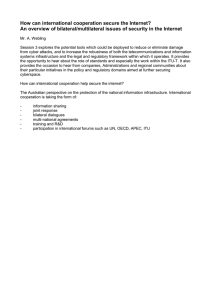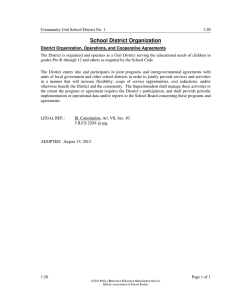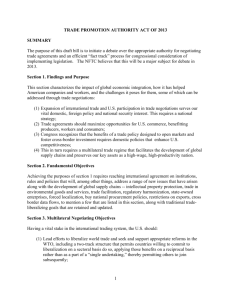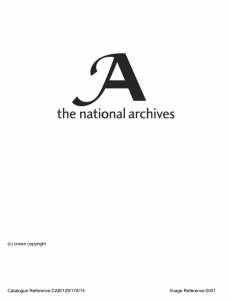verbatim Should Canada Pursue More Free Trade Agreements? Danielle Goldfarb
advertisement
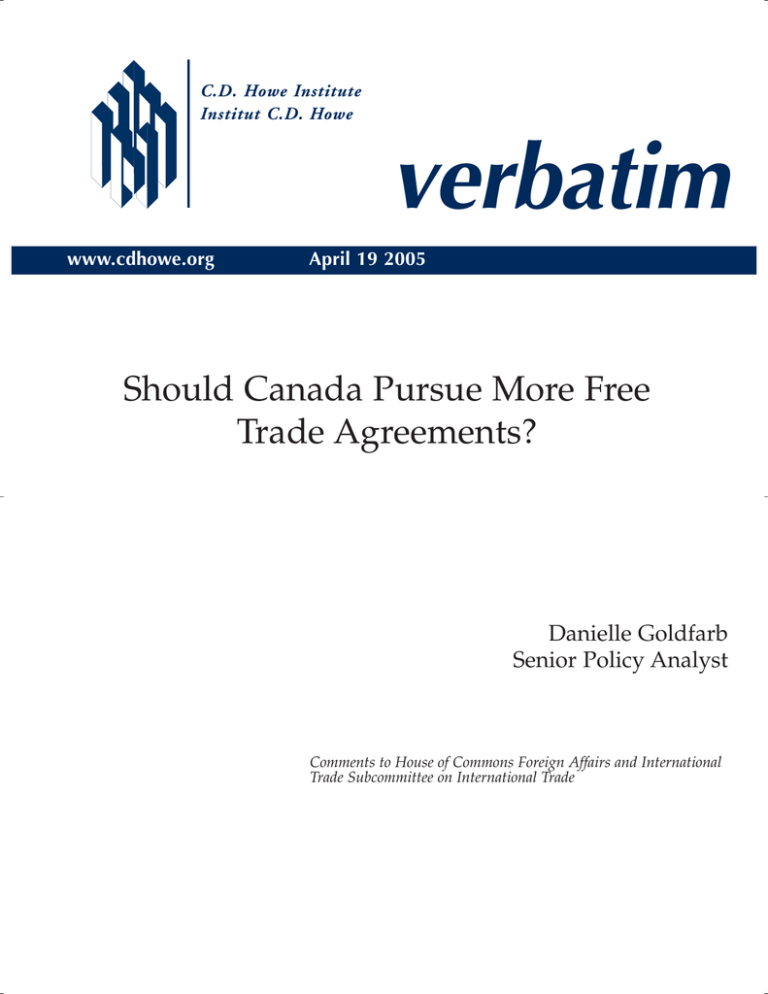
C.D. Howe Institute Institut C.D. Howe verbatim www.cdhowe.org April 19 2005 Should Canada Pursue More Free Trade Agreements? Danielle Goldfarb Senior Policy Analyst Comments to House of Commons Foreign Affairs and International Trade Subcommittee on International Trade C.D. Howe Institute verbatim T hank you for the opportunity to comment today on the government’s emerging markets strategy. I’ll focus on one of the questions asked in the terms of reference: Should Canada pursue more free trade agreements? In my view, most bilateral free trade accords are likely to result in only marginal and temporary gains for Canada, while requiring large amounts of government resources. Such agreements would further complicate the global trading system in which Canada has a large stake, and they could divert Canadian attention from more important priorities. Having said that, if policymakers are determined to proceed with free trade accords, a free trade agreement may be worth considering if Canada can interest a large, emerging market in a genuinely comprehensive accord, as long as policymakers have realistic expectations of its effects and don’t lose sight of this country’s paramount North American interests. Why the cautionary note about free trade accords? The inescapable fact is that this country’s economic relationships are overwhelmingly in North America. Current trade and investment with potential partner economies — including China, India and Brazil — though likely understated by traditional statistics, are minor. The reality is that most bilateral free trade agreements likely won’t result in large economic gains for Canada — either in trade or investment. Despite previous government attempts to increase Canada’s economic linkages outside of the U.S., Canadian businesses have not responded, and we cannot be certain that they would respond differently with a new free trade agreement. The public service’s own economic modeling apparently does not show important gains from most bilateral free trade agreements. As well, gains from free trade deals are transitory. The temporary advantage of Canada’s duty-free access to a particular market will be reduced as soon as that partner country negotiates duty-free access with another nation, and further undermined with each successive trade accord. And free trade agreements will not overcome those fundamental factors responsible for Canada’s declining share of global foreign direct investment. Because each new free trade agreement creates yet another set of overlapping rules, such accords complicate the international trading system, hindering trade in intermediate goods and detracting from Canada’s interests in a simple, predictable trading system. Not only that, these agreements are unlikely to spur multilateral initiatives in which Canada has a large stake, and could undermine them. Further, negotiating, signing and implementing bilateral free trade agreements is extremely resource-intensive relative to the expected economic effects. The whole process risks diverting resources from priority areas. For example, the U.S. bilateral agreements signed in 2003 account for only several percent of that country’s total trade, yet consumed almost 40 percent of the travel budget of the Office of the U.S. Trade Representative, and over 10 percent of its staff time, even when three-quarters of its negotiating teams came from other parts of the U.S. government (GAO 2004). So Canada should consider only those free trade agreements that have large potential payoffs and that merit this kind of attention. It may also prove difficult for Canada to find willing partners and successfully conclude an agreement. Why would countries expend their limited resources to negotiate access to Canada’s relatively small market, especially when this country 1 2 C.D. Howe Institute verbatim has not been willing to address those factors blocking previous bilateral accords? For example, negotiations with the European Free Trade Association have been stalled since 1998 over Canada’s high shipbuilding tariffs. As well, many large countries are simply not interested in opening up their markets. So Canada is limited to negotiating with a small list of countries that may have an interest in dealing with it. If Canada can, however, find willing partners with important economies, a bilateral agreement might be attractive. It would put Canada in the enviable position of being one of the only countries with free access to both the United States and another important economic power, possibly making this country a more attractive place to invest. To best advance Canada’s interests, such an agreement would have to go beyond just trade in goods to embrace services liberalization, minimize product exemptions and restrictive origin-rule requirements, reinforce multilateral efforts, and not come at the expense of dealing with barriers in the Canada-U.S. economic space. Before pursuing this option, policymakers must recognize that the benefit of such access would still be temporary and it would further complicate the trading system. In short, rather than pursue many bilateral free trade deals resulting in marginal gains, Canada would be better off focusing its limited resources in areas likely to yield large payoffs. Under this more positive strategy, the top priority would be ensuring continued secure and predictable access to the U.S. market. Other priorities would be investing in multilateral efforts that will ultimately yield the largest economic gains, and investing in domestic areas, such as education that allow Canadian companies to be more competitive. Finally, under this approach, if willing partners are available, if policymakers’ expectations about changes to trade and investment patterns are realistic, and if a deal can be structured to reinforce multilateral efforts, Canada might consider comprehensive free trade agreements with select important, emerging markets. Thanks very much for the opportunity to present these views. References United States General Accounting Office (GAO). 2004. Intensifying Free Trade: Negotiating Agenda Calls for Better Allocation of Staff and Resources. Report to Congressional Requesters. January.
